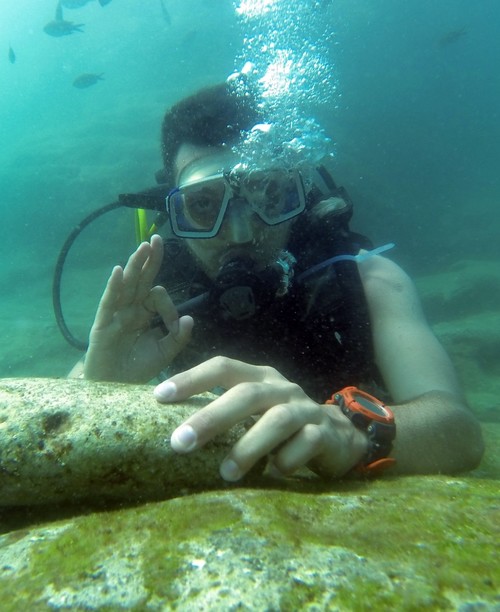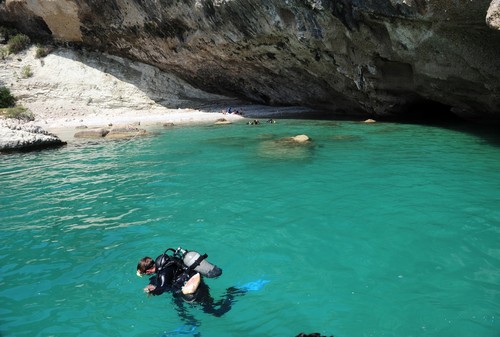© Turkuvaz Haberleşme ve Yayıncılık 2024
On average, 600 enthusiasts dive every day in Antalya's Kemer district. One of Turkey's most popular scuba diving spots, Kemer boasts 20 diving schools. Those who dive in Kemer's clear water often encounter stingrays, sea turtles, rare nudibranchs, lionfish, octopi, Mediterranean moray eels, leerfish, damselfish, saddled seabream and cuttlefish.
Moon Light, Kiriş Bay, Three Islands, Lighthouse, Kiris Cave Bay, Kiriş Aquarium Bay, the Pati wreck and the Paris II wreck are favorite spots for diving enthusiasts.Especially popular with Russians, tourists often take advantage of weekly tours through Kemer diving organizations to comfortably explore diving points appropriate for their certifications.

Hosting thousands of divers every year, one of the most popular diving spots in Kemer is the Paris II wreck. Considered one of the best diving spots in the world, the wreck is a 50 meter long and 8 meter wide famous French battle ship with six anti-aircraft guns weighing 551 tons and two torpedo shells. After being discovered in 1955, it became a fast favorite of divers and underwater photographers.Diving instructor Ali Sivrikaya told Anadolu Agency (AA) that 20 diving centers are operating in Kemer with the support of the Turkey Underwater Sports Federation, stressing that scuba diving tourism significantly contributes to tourism in Turkey.
"The majority of diving enthusiasts are Russian, while European and local guests have also shown more interest in diving in recent years," Sivrikaya said. "Interest in diving has been high in recent years. Diving is especially common in Russia and European countries. About 10 years ago, the number of divers registered in landlocked Switzerland was more than in Turkey. Now this has changed. The fact that this activity is on the rise in Turkey is excellent."

Sivrikaya also pointed out that diving enthusiasts are able to see rare fish species during their underwater explorations. "The Paris II wreck is among the top places to dive. The French blockaded this place in the past, but our soldiers continued to watch out for our interests just like they have in the past. The interest in this wreck continues to feed Kemer's underwater tourism sector," he added.
Sivrikaya stated that scuba diving is a sport that anyone can do as long as they are careful to follow the rules and take at least an introductory course in their native language before diving for the first time.
Sivrikaya also said daily tour boats are not allowed to enter the diving areas according to rules set by Kemer Governor's Office, adding that these rules are beneficial for both diving safety and increasing the underwater population.
Glad that they do not have to drop anchors thanks to the kedging system, Sivrikaya said they use kedge anchors to preserve the integrity of the guide ropes and to minimize environmental impact.
Referring to the fact that Egypt is a leading country in diving tourism, Sivrikaya stated that Egypt has made an industry out of this business and that diving tourism brings in significant income to Egypt. "We also need to turn this into an industry in Turkey. We must create artificial reefs, produce new diving points and concentrate on this subject as a country," Sivrikaya noted.
Narin Lenssens traveled to Kemer from Belgium to dive and said she likes diving very much and wants to rediscover what lies beneath the surface.
Highlighting how fantastic diving is, Lenssens said the underwater ecosystem is very interesting and clean. "It's a good feeling to see different kinds of fish. Everything was perfect," she said.
Ali Ayub, who came with his family from Pakistan, said he was trying the sport for the first time and had a lot of fun, stressing that now that he has scuba experience, he wants to come back to dive in Kemer.
Frederick Troster, who came from Ankara Atılım University to dive with his friends, said he has been diving since 2014. "I really like the Paris II wreck. There are unexploded bombs, tiles and gorgeous fish hidden there. It can't be described, only experienced. I think everybody needs to breathe underwater once before they die," Troster said.
